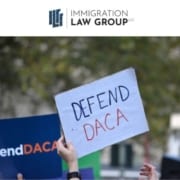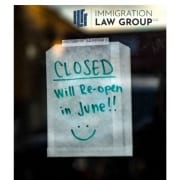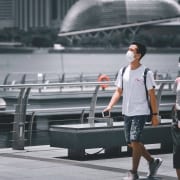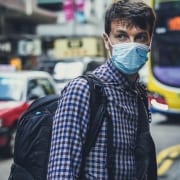Coronavirus Pandemic (COVID-19) Impacts on Immigrant Applicants
Recent measures taken by the United States government, in an effort to halt the spread of coronavirus (COVID-19), have disrupted immigration services and proceedings. Here is a brief overview of commonly asked questions regarding how this pandemic will affect noncitizens, particularly green card and naturalization applicants.
Impact on Interviews and Appointments
Since March 18th, USCIS has temporarily suspended routine in-person services through at least May 3 in efforts to slow the spread of COVID-19. USCIS provides emergency services for very limited situations; in order to schedule an emergency appointment, contact the USCIS Contact Center. USCIS staff will continue to perform duties that do not involve any physical contact.
Please note that you can create an account with the USCIS Online Portal in order to view your current application case status, your case history, the next steps for service requests, and you can receive case updates by text or email. Sign up here. Doing this will allow you to stay up-to-date on your application.
Q: Is my interview still scheduled?
USCIS offices will send notices with instructions to applicants and petitioners with scheduled interview appointments impacted by this closure. Once normal operations are able to be resumed, they will automatically be rescheduled.
If you have yet to hear from your consulate office, call your consulate office. You can check the USCIS Field Offices page to see if your field office has reopened before reaching out to the USCIS Contact Center.
Q: What should I do if my interview is cancelled for my adjustment of status application?
Wait for USCIS to contact you with further instructions. Signing up with the USCIS Online Portal will allow you to get immediate access to information regarding rescheduling.
Q: What if I had an InfoPass appointment?
If you had an InfoPass appointment with a Field Office, you must reschedule your appointment through the USCIS Contact Center.
Q: Because USCIS offices are closed, what will happen to my biometrics appointment and how will this impact my application?
USCIS has temporarily suspended all biometrics appointments. When USCIS resumes normal operations, your biometrics appointment will be automatically rescheduled within 90 days. You can call 800-375-5283 if you do not receive this rescheduled appointment.
Q: Because USCIS offices are closed, what will happen to my asylum appointment?
If you have an asylum application pending with USCIS, your case status can be checked online (you will need the receipt number mailed to you after you filed your application). If you need to contact your local asylum office, you can use the Asylum Office Locator.
Q: Because USCIS offices are closed, when will I be able to reschedule my naturalization ceremony?
USCIS will automatically reschedule your ceremony. A notice for your scheduled ceremony should be received by mail. If, in the next 90 days, you have not received this notice, reach out to USCIS Contact Center.
Q: If I am out of the country, am I able to switch consulate offices for an interview?
Call the National Visa Center (NVC). Switching consulate offices depends upon the circumstances.
Impact on Processing times
Q: How will the processing time of the application be impacted if my application is submitted? If my green card or naturalization application is submitted now, how will the processing time of the application be impacted?
All visa processing times are dependent upon the spread of COVID-19. If USCIS has informed you about rescheduling your biometrics or interview appointment, please follow the instructions in the sent document. All USCIS-related domestic delays can be kept track of here.
Note that all applications turned into USCIS are still being processed at their respective lockbox, but this process is taking longer than usual given the circumstances. Work and travel permits cannot be processed without a biometrics notice. Depending on how long the closures remain, this will add to the 5-8 months processing times for a work and travel permit, and to the 11- to 14-month processing time for a green card.
Travel-Related Questions
Q: If I am overstaying my visa due to travel restrictions or limited flights, how will this impact my application?
Under usual circumstances, nonimmigrants must depart the United States before their authorized period of admission expires. However, USCIS recognizes that nonimmigrants may unexpectedly remain in the U.S. beyond their authorized period of stay. USCIS notes the following:
- Apply for an Extension: Most nonimmigrants can file an application for extension of stay (EOS) or change in status (COS) to avoid the immigration consequences of COVID-19.
- File in a Timely Manner: if a nonimmigrant’s timely-filed EOS or COS application is pending, he or she will generally not accrue an unlawful presence.
- New Flexibility for Late Applications: USCIS may excuse a nonimmigrant’s failure to timely file an extension/change of status request if the delay was due to extraordinary circumstances. Under current regulations and as noted on our Special Situations page, if a petitioner or applicant files an extension of stay or change of status request (on Forms I-129 or I-539) after the authorized period of admission expires, USCIS may excuse the failure to timely file if it was due to extraordinary circumstances beyond their control, such as those that may be caused by COVID-19. The length of delay must be commensurate with the circumstances. The petitioner or applicant must submit credible evidence to support their request, which USCIS will evaluate in its discretion on a case-by-case basis. These special situations have been used at various times in the past, including for natural disasters and similar crises.
- New Flexibility for Visa Waiver Entrants: Visa Waiver Program (VWP) entrants are not eligible to extend their stay or change status. However, under current regulations, if an emergency (such as COVID-19) prevents the departure of a VWP entrant, USCIS in its discretion may grant up to 30 days to allow for satisfactory departure. Please see 8 CFR 217.3(a). For those VWP entrants already granted satisfactory departure and unable to depart within this 30-day period because of COVID-19 related issues, USCIS has the authority to temporarily provide an additional 30-day period of satisfactory departure. To request satisfactory departure from USCIS, a VWP entrant should call the USCIS Contact Center.
- If you would like additional information on late requests to extend or change status, you can look over 8 CFR 214.1(c)(4) and 8 CFR 248.1(c). In addition, please see Form I-129 and Form I-539 pages for specific filing and eligibility requirements for extensions and changes of status.
Q: How can I get passport photographs if there is a stay-at-home order?
The State Department has this tool to help you crop a photograph of yourself that will satisfy the passport photo requirement. There are many websites online (such as this one) that also mail your photographs to your home address.
Impact on USCIS Requests
Q: What approaches are USCIS taking to increase flexibility?
On March 27, 2020, USCIS announced that it would allow an extra 60 days for a timely response to all Requests for Evidence (RFE) and Notices of Intent to Deny (NOID) dated between March 1, 2020, and May 1, 2020. This flexibility also applies to certain Notices of Intent to Revoke (NOIR) and Notices of Intent to Terminate (NOIT) regional investment centers, and certain filing date requirements for Form I-290B, Notice of Appeal or Motion. USCIS will not issue new RFEs or NOIDs to account for the extended period of time. Rather, it will not take any action on the RFE or NOID until more than 60 days beyond the deadline.
When to Apply?
Q: If I have yet to submit my application, will my I-130 be impacted?
While processing times will increase, USCIS offices still accept I-130 applications.
Q: When should I submit my marriage-based green card application?
USCIS still accepts marriage-based green card applications.
Impact on Health Care
Q: How will being diagnosed with COVID-19 impact my green card or naturalization application?
Care received at the emergency room, at a community health clinic, or at a free clinic does not trigger the Public Charge rule. USCIS issued a recent statement clarifying that any treatment or preventative service related to COVID-19 will not negatively affect any individual as part of a Public-Charge analysis.
Q: How will getting tested for COVID-19 impact my green card or naturalization application under the Public Charge rule?
You will not be impacted. Getting tested for seeking treatment for COVID-19 would not count against a would-be immigrant under the Public Charge rule. Accessing discounted care at hospitals, clinics, or other facilities will not be listed as a Public Benefit. Here is a list of government benefits that are considered during a Public Charge assessment.
Q: If I am receiving unemployment benefits, will my green card or naturalization application be negatively impacted under the Public Charge rule?
Unemployment insurance is not included in the government’s list of categories of benefits that make someone a potential public charge. If you do rely on additional government benefits that are included on the government’s list, it is recommended that you attach a letter of explanation to your future application to note how the coronavirus pandemic affected your ability to work and conduct your usual activities.
Impacts of Relief Bill on Visa Applicants
The Coronavirus Aid, Relief and Economic Security, or CARES, Act states that immigrants are excluded from the stimulus payments, with one exception. Green-card holders are the only exception and will receive stimulus payments if they qualify. Otherwise, immigrants (including immigrants who are in the U.S. on work visas and pay taxes) are not eligible for the payments. Additionally, American citizens who are married to immigrants without Social Security numbers will not receive stimulus checks as part of the government’s COVID-19 relief efforts.
Impacts on International Students
Q: If I am an international student with an F-1 visa, but want to leave the U.S. for longer than five months, will this violate my F-1 status?
Current F-1 regulations state that a student may reenter the U.S. only after a temporary absence no longer than five months.
The DHS Student and Exchange Visitor Program (SEVP) is issuing updated guidance, confirming that international students with an active status will not be subject to this five-month rule. The only exception is for students enrolled in full-time study abroad programs.
Q: Will my SEVIS record be negatively impacted if I am doing remote learning abroad?
Your F-1 record will not be impacted during the temporary COVID-19 accommodation period, because you will be taking online courses as a student.
Q: I am an F-1 student who has been experiencing severe economic hardships because of the pandemic. What can I do?
F-1 students who are experiencing economic hardships because of unexpected circumstances, such as the pandemic, can request employment authorization to work off-campus by filing Form I-765 Application for Employment Authorization and Form I-20, along with any additional supporting materials. For more, click here.
Such students would be eligible to apply for off-campus employment authorization if they are:
- A citizen of a country specified in a Federal Register notice;
- Have been lawfully present in the United States for the period indicated in the Federal Register notice;
- Have reported on time to their Designated School Official and been enrolled in a Student and Exchange Visitor Program-certified school since the special situation;
- Currently maintaining F-1 status; and
- Experiencing severe economic hardship.
USCIS may also discretionarily authorize special student relief and suspend certain requirements that would normally be mandatory for individuals from certain parts of the world that the secretary of Homeland Security identifies as experiencing emergency circumstances.
Impact on H-2A Workers
Q: How will the recent temporary changes to H-2A requirements impact me, if I am a foreign worker in the U.S. with a valid H-2A status?
The DHS and USCIS have published a temporary final amendment on some H-2A requirements so that U.S. agricultural employers may avoid disruptions in lawful agricultural-related employment, to protect the nation’s food supply chain, and to decrease the effects of COVID-19 on national public health. Under this temporary rule, foreign workers in the U.S. with H-2A status can be employed by H-2A petitioners with valid temporary labor certification immediately after USCIS receives the H-2A petition.
Q: I am an H-2A worker but am nearing my three-year maximum allowable period of stay in the United States. However, I cannot leave due to travel restrictions related to COVID-19. What should I do?
USCIS is temporarily amending its regulations to allow H-2A workers to stay beyond the three-year maximum period. These temporary changes will support lawful employment of foreign temporary and seasonal agriculture workers during the COVID-19.
Note: only once this petition in approved and published in the Federal Register, H-2A workers will be able to stay in the U.S. for a period of time validated by the Temporary Labor Certification. If DHS determines that future circumstances illustrate a continued need for changes to H-2A regulation, DHS will issue a new temporary final rule in the Federal Register to amend the termination date.
If you have questions about how these new changes may affect your case, please contact us on our website, by email at [email protected] or give us a call at (866) 691-9894.











